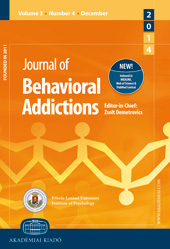Predictors and Patterns of Problematic Internet Game Use Using a Decision Tree Model
Predictors and Patterns of Problematic Internet Game Use Using a Decision Tree Model
Author(s): Mi Jung Rho, Jo-Eun Jeong, Ji-Won Chun, Hyun Cho, Dong Jin Jung, Inyoung Choi, Dai-Jin KimSubject(s): Cognitive Psychology, Behaviorism, Crowd Psychology: Mass phenomena and political interactions, Substance abuse and addiction, Social Informatics
Published by: Akadémiai Kiadó
Keywords: problematic Internet game use; predictors; pattern; decision tree analysis; chi-square automatic interaction detector;
Summary/Abstract: Problematic Internet game use is an important social issue that increases social expenditures for both individuals and nations. This study identified predictors and patterns of problematic Internet game use. Methods: Data were collected from online surveys between November 26 and December 26, 2014. We identified 3,881 Internet game users from a total of 5,003 respondents. A total of 511 participants were assigned to the problematic Internet game user group according to the Diagnostic and Statistical Manual of Mental Disorders Internet gaming disorder criteria. From the remaining 3,370 participants, we used propensity score matching to develop a normal comparison group of 511 participants. In all, 1,022 participants were analyzed using the chi-square automatic interaction detector (CHAID) algorithm. Results: According to the CHAID algorithm, six important predictors were found: gaming costs (50%), average weekday gaming time (23%), offline Internet gaming community meeting attendance (13%), average weekend and holiday gaming time (7%), marital status (4%), and self-perceptions of addiction to Internet game use (3%). In addition, three patterns out of six classification rules were explored: cost-consuming, socializing, and solitary gamers. Conclusion: This study provides direction for future work on the screening of problematic Internet game use in adults.
Journal: Journal of Behavioral Addictions
- Issue Year: 5/2016
- Issue No: 3
- Page Range: 500-509
- Page Count: 10
- Language: English

